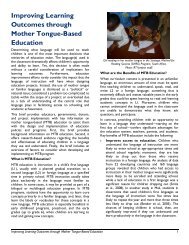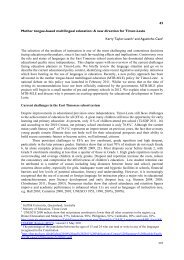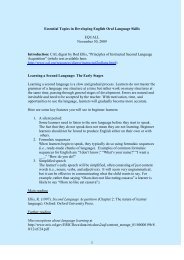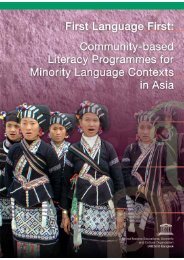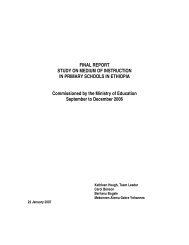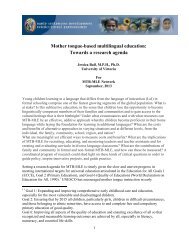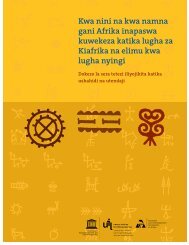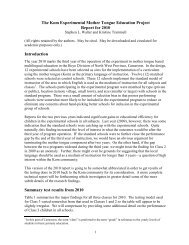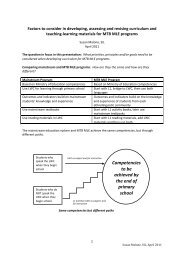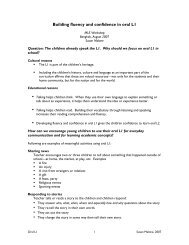Part II.pdf - MTB-MLE Network
Part II.pdf - MTB-MLE Network
Part II.pdf - MTB-MLE Network
You also want an ePaper? Increase the reach of your titles
YUMPU automatically turns print PDFs into web optimized ePapers that Google loves.
limited opportunities to raise funds locally for education, and this is a great hindrance for the<br />
development of adult bilingual literacy. There is also a lack of bilingual literacy materials.<br />
5. Bilingual literacy project for the Lahu minority<br />
Context of the project<br />
Illiteracy, which is viciously interconnected with poverty, is a bottleneck for economic, social, and<br />
political development among poor ethnic groups. It is a serious problem that many countries have<br />
to face, especially developing countries.<br />
It has long been a major concern in China to improve the literacy rate of ethnic groups. Among<br />
the ethnic groups in China, the Lahu nationality has the fewest average schooling years, and the<br />
adult literacy rate, especially among women, is the lowest among the county’s minorities. About<br />
60% of Lahu people in China live in Lancang County. In the west and southwest, Lancang County<br />
borders Myanmar. According to the 1990 population census, the average time in school for Lahu<br />
people is only 1.4 years. This results in poorly educated local people, and also hinders the economic<br />
development and the quality of life for Lahu people. Lancang County has been listed as one of<br />
the most poverty-stricken counties in the nation.<br />
Since 1949, adult literacy work in Lancang County has received government support and<br />
encouragement. Literacy and continuing education have been targeted at various levels. However,<br />
little observable impact has been achieved, and literacy and continuing education has developed<br />
quite slowly. Since 1997, the Research and Training Centre for Literacy Education (RTCLE) has<br />
conducted research on innovative approaches to literacy and continuing education in Lancang County.<br />
The reason Lancang County was chosen is that literacy and continuing education there is typical<br />
of many other places and because its ethnic character, location, language situation, cultural diversity<br />
and level of education and economic development present many challenges.<br />
The researchers from RTCLE and Lancang County, including literacy facilitators, have carried out<br />
projects on the integration of literacy and practical skills. Through the project, target learners have<br />
become interested in literacy, and family income has benefited. However, through field survey,<br />
participant observation and interviews with community members, the researchers have identified<br />
a significant challenge with transition from the Lahu language to Han Chinese. Adult literacy and<br />
continuing education for Lahu people develops slowly. There are many reasons for this, and the<br />
language problem is central. Almost all the reading materials on life skills and practical skills that<br />
are available are in Han Chinese and, within the community, people do not use the Han language.<br />
The illiterate Lahu do not learn the Lahu writing system and, in turn, have difficulty learning the<br />
Han language. Almost all the learning materials and audio-visual materials available on technological<br />
development, rural practical techniques and health education have been developed in the Han language.<br />
Originally, teaching was conducted in Chinese. Temporarily, it seemed that this met the needs of<br />
a group of learners, and learning took place. However, it seemed that the literacy skills acquired<br />
were soon lost, as it was difficult to apply them to daily life. Thus, there is a high rate of regression<br />
back to illiteracy among ethnic minorities. This seems to be a universal phenomenon among ethnic<br />
minorities in China.<br />
156





